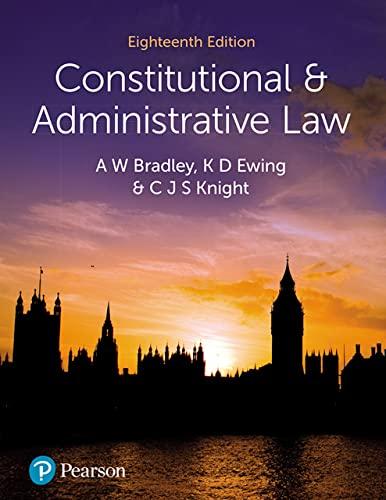Question
1. Timothy contracts with Fabian to renovate his kitchen for $35,000. Before beginning the project, Fabian anticipatorily repudiates. Timothy brings in four more contractors to
1.
Timothy contracts with Fabian to renovate his kitchen for $35,000. Before beginning the project, Fabian anticipatorily repudiates. Timothy brings in four more contractors to bid on the project, using the same specifications that he had given to Fabian. The highest bid was for $49,000. The lowest was for $38,000. The average bid was $41,000. Timothy takes the lowest bid for $38,000. The contractor completes the project competently.
Timothy then brings a suit against Fabian for $3,000. Fabian, during the trial, introduces evidence that Grant, another contractor in the area, would have bid $32,000 for the job if Fabian had contacted him. Accordingly, Fabian argues that he should owe Timothy nothing.
Based on the facts provided, which is the most accurate statement about this situation:
A. Fabian is correct. Timothy failed to appropriately mitigate his damages and thus is limited to recovering the difference between the amount of the contract and the amount that he could recover if he had mitigated, which in this case is zero.
B. Fabian is correct. Timothy failed to act in good faith. Accordingly, he should be barred from a recovery.
C. Fabian is incorrect. Timothy reasonably attempted to mitigate his damages.
D. Fabian is incorrect. Timothy had every right to go with any substitute contractor that he believed would provide quality services.
2. Which of the following is a key distinction between an anticipatory repudiation and doubts giving rise to a request for adequate assurances for performance? A. Repudiation is final, whereas doubts giving rise to a request for adequate assurances for performance may be retracted.
B. Repudiation must be unequivocal, whereas doubts giving rise to a request for adequate assurances for performance are based on the subjective fears of the insecure party.
C. Repudiation may be retracted, whereas doubts giving rise to a request for adequate assurances for performance cannot be retracted.
D. Repudiation must be unequivocal, whereas doubts giving rise to a request for adequate assurances for performance are determined by the objective doubts of the insecure party.
3. Developer contracts with Contractor to build an office building for $10 million. Midway through the project, however, developer repudiates. At the time of the repudiation, Contractor had incurred $2.5 million in labor and material expenses. Contractor will be able to reuse some of the materials on another project, saving Contractor $250,000 on that project. Contractor would have spent an additional $6 million to finish the office building for Developer.
Which of the following statements is most accurate about the Contractor's expectation damages:
A. The Contractor should get $4 million in damages.
B. The Contractor should get $1.5 million in damages.
C. The Contractor should get $3.75 million in damages.
D. The Contractor should get $1.25 million in damages.
4. Portia hires Fred under a 2-year employment contract for a salary of $70,000 per year, payable in installments at the end of each month. Six months after Fred starts work, Portia wrongfully fires him. Fred looks for work, diligently, for four months but is unable to find a job. Finally, Fred hires an employment agency, paying a one-time fee of $2,000. Two months later, he obtains a job very similar to the one from which he was fired paying $65,000 per year.
Imagine that Fred sues Portia and wins on liability. What are Fred's damages?
A. $142,000
B. $42,000
C. $107,000
D. None of the above is accurate.
5. Audrey enters into a contract to sell cast a picture of Robert Downey Jr. (Ironman), Chris Evans (Captain America), Chris Helmsworth (Thor), Scarlett Johansson (Black Widow), Mark Ruffalo (The Hulk), Chadwick Boseman (Black Panther), and Brie Larson (Captain Marvel), signed by all of the actors, for $350 to Gemma on May 1. May 1, however, comes and goes and Gemma never shows up with the money, never calls, and provides no explanation for her absence. After several efforts to contact Gemma, Audrey rightfully declares Gemma in total breach. Which of the following statements is most accurate. A. Audrey has a duty to try to resell the picture. B. If Audrey does not try to resell the picture, she will nevertheless be treated as if she had done so and her damages will be capped at whatever the differential would have been between the a hypothetical but reasonable resale price and the contract price with Gemma. C. Gemma has a duty to try to find another buyer for the picture.
Step by Step Solution
There are 3 Steps involved in it
Step: 1

Get Instant Access to Expert-Tailored Solutions
See step-by-step solutions with expert insights and AI powered tools for academic success
Step: 2

Step: 3

Ace Your Homework with AI
Get the answers you need in no time with our AI-driven, step-by-step assistance
Get Started


